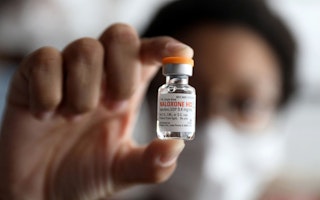Methadone as a Human Right
By Kathleen Kingsbury

“We are people and we have the right to live.”
With this clear message at the forefront, Russian activist Irina Teplinskaya on Sunday appealed to UN High Commissioner for Human Rights Navi Pillay to push the Russian government to legalize methadone and buprenorphine, the world's most widely used and effective opiate substitution treatments (OST). According to the World Health Organization (WHO), Russia has more than three million people who regularly use heroin, yet the country’s leaders have routinely refused to finance basic harm reduction services, including needle exchange or substitution therapies, a stance that has fueled one of the world’s fastest-growing HIV/AIDS epidemics. WHO research concludes OST remains perhaps the clearest means of curbing this deadly trend.
“Tens of thousands of young Russians die every year because the law in this country forbids the use of substitution therapy, as recommended by the UN and successfully used in all the world’s developed countries,” Teplinskaya told Pillay in their meeting Sunday. “These programs help to stabilize the lives of drug-dependent people, improve their health condition, and help prevent HIV infection and lower crime rates.”
Pillay is in Russia this week to conduct high-level meetings with President Dmitry Medvedev and other government officials, as well as human rights actors and civil society leaders. The Open Society Public Health Program, International Harm Reduction Association, and 14 other advocacy organizations worldwide—many of whom are Open Society grantees—signed on to a joint letter to Pillay asking that she use her visit to address the need for additional HIV prevention measures in Russia, including harm reduction and OST.
Teplinskaya used her own personal story to illustrate why Pillay should make this issue a human rights priority: already infected with HIV and Hepatitis C through used syringes, Teplinskaya went on to contract tuberculosis while imprisoned in 2007 but was still denied essential medications. "I have had several unsuccessful attempts at treatment in different clinics, but continue to return to drugs," she said, adding, “In order for me to receive the life-saving treatment for HIV that should be guaranteed to me by the state, I was forced to go on hunger strike and cut open my veins.”
Now a vocal advocate in Moscow for fellow drug users as a volunteer for PHP grantee Andrey Rylkov Foundation, Teplinskaya has also filed a complaint against Russia for its lack of effective drug treatment with the U.N. Special Rapporteur on Health Rights and is in the process of preparing a similar complaint with the European Court of Human Rights. A Reuters article on Pillay’s visit Friday called Teplinskaya “a symbol of Russia’s drug woes.”
The full text of Teplinskaya’s speech to the High Commissioner as well as more details on her personal story can be found in English and Russian on the Andrey Rylkov Foundation website.
Until October 2011, Kathleen Kingsbury was a program officer for communications with the International Harm Reduction Development Program, a part of the Open Society Public Health Program.

